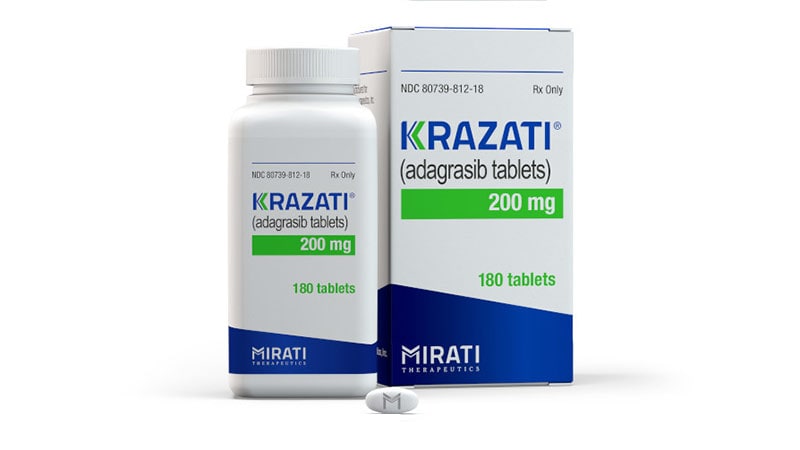The US Food and Drug Administration (FDA) has granted accelerated approval to adagrasib (Krazati) for use in adults with KRAS G12C-mutated locally advanced or metastatic non–small cell lung cancer (NSCLC) that has progressed on at least one prior systemic therapy.
Suitability for this therapy is to be determined by an FDA-approved test. The agency also approved two companion diagnostics: Qiagen’s therascreen KRAS RGQ PCR kit (for tissue testing), and the Agilent Resolution ctDx FIRST Assay (for plasma testing).
“If no mutation is detected in a plasma specimen, the tumor tissue should be tested,” FDA said in a press release announcing the approval.
Adagrasib is the second drug to target KRAS mutations. It joins sotorasib (Lumakras), which was approved by the FDA in May 2021. At the time, the approval was considered a historic milestone, as it provided, for the first time, a treatment for these patients.
Both adagrasib and sotorasib target the KRAS G12C mutation, which accounts for about 13% to 14% of NSCLC mutations.
The accelerated approval for adagrasib was based on data from the open-label, single-arm KRYSTAL-1 trial, which involved 112 patients with KRAS G12C-mutated tumors that had progressed on or after platinum-based chemotherapy and an immune checkpoint inhibitor.
The objective response rate was 43%; 80% of patients achieved disease control. The median durability of response was 8.4 months.
The data “demonstrate the effectiveness of adagrasib as an option for these difficult-to-treat patients,” said Shirish M. Gadgeel, MD, chief of the Division of Hematology and Oncology, Department of Internal Medicine, Henry Ford Cancer Institute/Henry Ford Health System. She was quoted in a press release from the manufacturer, Mirati Therapeutics.
“Continued approval for this indication may be contingent upon verification and description of a clinical benefit in a confirmatory trial(s),” the company and the agency commented.
“We look forward to continuing to advance our adagrasib development program, including several monotherapy and combination studies in KRAS G12C-mutated solid tumors,” said David Meek, Mirati chief executive officer. As well as clinical trails in NSCLC, the company is conducting ongoing studies involving patients with colorectal cancer and pancreatic cancer.
The most common adverse reactions reported with adagrasib, which occurred in 20% or more of patients, were diarrhea, nausea, fatigue, vomiting, musculoskeletal pain, hepatotoxicity, renal impairment, dyspnea, edema, decreased appetite, cough, pneumonia, dizziness, constipation, abdominal pain, and QTc interval prolongation.
The most common laboratory abnormalities, which occurred in at least a quarter of patients, included decreased lymphocytes, increased aspartate aminotransferase, decreased sodium, decreased hemoglobin, increased creatinine, and decreased albumin, among others.
The recommended dose is 600 mg orally twice daily until disease progression or unacceptable toxicity.
Full prescribing information for adagraib is available here.
For more news, follow Medscape on Facebook, Twitter, Instagram, and YouTube.
Source: Read Full Article
